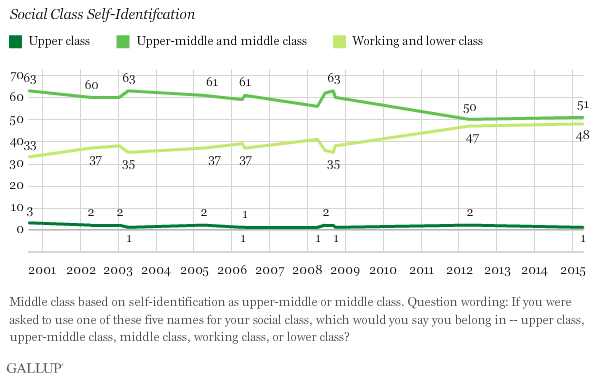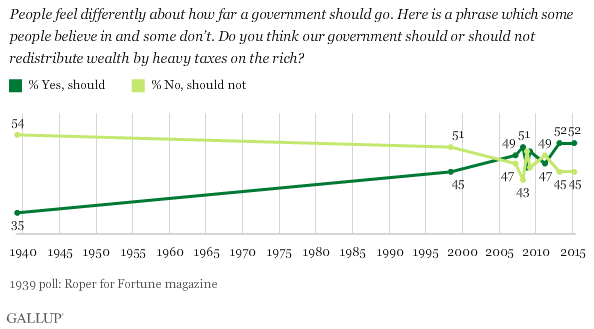It's Not Just Bernie: Economic Populism is on the Rise in America
By:
Mainstream political punditry doesn’t give Vermont Sen. Bernie Sanders (D-Vt.) much of a chance at besting former Senator and Secretary of State Hillary Clinton for the Democratic presidential nomination in 2016, and current polling of likely Democratic primary voters may back that up. But despite those long odds, it’s clear that Sanders’ campaign has struck a nerve with a significant portion of the American populace.
The Sanders campaign announced earlier this month that it raised about $1.5 million within the first 24 hours of launching. That’s more than the campaigns of three Republican Senators who are expected to have a better shot at the White House in 2016: Sen. Marco Rubio (R-Fla.), Sen. Rand Paul (R-Ky.), and Sen. Ted Cruz (R-Texas). The excitement around Sanders' campaign is almost entirely due to his focus on issues of economic populism: raising the minimum wage, increasing Social Security benefits, making college free, and regulating Wall Street.
But a common theme of his campaign? The government is working for billionaires, and the middle class is being left behind.
The numbers don't lie.
Improving the economy and helping the middle class have always been prominent campaign themes on both sides of the aisle, but the rhetoric and urgency underlying the messages is taking on more stridency—and recent polling shows exactly why.
Back in 2001, nearly twice as many Americans (63 percent) identified as middle class compared to those who felt that they were in the lower class or working class (33 percent), according to Gallup. Those numbers were fairly consistent until the recession hit toward the end of 2008. Now, they are just about even -- in Gallup’s latest survey at the end of April, only 51 percent of Americans reported being in the middle class while 48 percent identified as being lower-class or working-class.
 Gallup - gallup.com
Gallup - gallup.com
That’s a sharp drop-off—and while young adults haven’t been the hardest-hit by the trend, they’ve certainly been a part of the decline. According to the age breakdown, 55 percent of those between 18 and 29 years of age considered themselves in the middle class in 2001. Now, only 47 percent do. According to the Gallup report, the recession has led many Americans to change how they think of themselves:
This could suggest that Americans have shifted into a "new normal" way of looking at their class standing, with the Great Recession having convinced a number of Americans that they are not now, nor are they going to be, middle class -- but rather are firmly ensconced in either the working or lower class.
What do people want now from politicians?
The notable change in Americans’ self-perception of their class status has also had an interesting effect on their desired policy outcomes. For the vast bulk of the six decades from 1940 to 2000, a majority of Americans did not feel that there should be heavy taxes on the wealthy to redistribute wealth. The number of people who answered “yes” had been on a very gradual upward trend, though (see graph below). That trend accelerated starting in about 2000, but the advent of the Great Recession made the polling much more volatile. For the first time since Gallup started tracking the question, an absolute majority (52 percent to 45 percent) believed that the government should levy heavy taxes on the rich to redistribute income.
 Gallup - gallup.com
Gallup - gallup.com
From a purely political perspective, these trends will likely end up favoring the eventual Democratic nominee: For Republicans—and conservatives more broadly—“redistribution” is a politically charged word that they seek to equate with communism, socialism, or even anti-American sentiment. In terms of policy, they’re much more likely to favor a supply-side model of cutting taxes for wealthy people and businesses on the theory that making more money available for businesses and the wealthy will allow those groups to create more jobs, and thus let wealth “trickle down” to the middle and lower classes. Democratic politicians, by contrast, are much more likely to support raising taxes on the wealthy to fund social programs and invest in capital improvement projects under the theory that jobs can be created more directly and efficiently that way.
In the context of the history of American opinion, the fact that a majority of the country actively supports redistribution is very telling. It suggests that during the 2016 campaign, a message centered around economic populism will resonate more than at any time in the past several decades. This might be a tough line to walk for a Republican nominee, but Democrats will have a much easier time conveying that message with authenticity.
Sen. Sanders is counting on the fact that an underdog campaign based on economic populism can catch fire and secure the Democratic nomination. The zeitgeist is with him—but even if it can’t carry him to a massive upset, it will be no surprise if Ms. Clinton ends up using many of Sanders’ messages throughout her campaign against her eventual Republican opponent. Rarely has there been a better time for a presidential campaign based on the principles of economic populism.
You can register to vote at OurTime.org.
